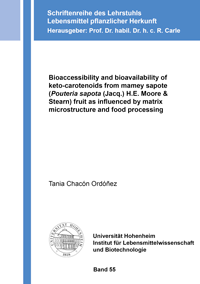
Shop : Details
Shop
Details
35,80 €ISBN 978-3-8440-6748-4Softcover170 pages19 figures252 g21 x 14,8 cmEnglishThesis
July 2019
Tania Chacón Ordóñez
Bioaccessibility and bioavailability of keto-carotenoids from mamey sapote (Pouteria sapota (Jacq.) H.E. Moore & Stearn) fruit as influenced by matrix microstructure and food processing
Carotenoids are fat-soluble natural pigments widely distributed in nature. They have gained particular interest due to the potential health benefits that can be obtained when included in the human diet. Among these health benefits, the most prominent is their metabolic conversion to vitamin A. Humans are incapable of synthesizing carotenoids and vitamin A, thus relying on the consumption of food rich in provitamin A carotenoids or preformed vitamin A in order to prevent a series of adverse health conditions. Despite numerous programs, e.g., of the World Health Organization (WHO), vitamin A deficiency continues to be one of the leading causes of preventable child blindness worldwide, being part of a wide range of widespread micronutrient deficiencies. As part of the efforts to diminish the malnutrition caused by deficiencies of key vitamins and minerals, several strategies, like supplementation programs, have been carried out over the past years. One recommendation is to improve diet diversity by including fruits and vegetables rich in micronutrients, such as provitamin A carotenoids, which are locally accessible to the populations in risk. This strategy might be particularly useful for human populations from tropical developing countries due to the high variety of fruits and vegetables available throughout the year. Hence, there is high interest to study new promissory sources with high carotenoid content that can fulfill vitamin A daily requirements. Therefore, this doctoral thesis aimed at gaining further insights into the nutritional potential of mamey sapote fruit (Pouteria sapota (Jacq.) H.E. Moore & Stearn) as a promissory source of carotenoids, particular those with provitamin A activity.
Keywords: Carotenoids; bioaccessibility; bioavailability; mamey sapote fruit; matrix microstructure; food processing; carotenoid esters; Pouteria sapota (Jacq.) H.E. Moore & Stearn
Schriftenreihe des Lehrstuhls Lebensmittel pflanzlicher Herkunft
Edited by Prof. Dr. habil. Dr. h. c. Reinhold Carle, Stuttgart
Volume 2019,55
Available online documents for this title
You need Adobe Reader, to view these files. Here you will find a little help and information for downloading the PDF files.
Please note that the online documents cannot be printed or edited.
Please also see further information at: Help and Information.
Please also see further information at: Help and Information.
| Document |  | Document | ||
| Type |  | |||
| Costs |  | 26,85 € | ||
| Action |  | Purchase in obligation and download the file | ||
| Document |  | Table of contents | ||
| Type |  | |||
| Costs |  | free | ||
| Action |  | Download the file | ||
User settings for registered online customers (online documents)
You can change your address details here and access documents you have already ordered.
User
Not logged in
Export of bibliographic data
Shaker Verlag GmbH
Am Langen Graben 15a
52353 Düren
Germany
Am Langen Graben 15a
52353 Düren
Germany
Mon. - Thurs. 8:00 a.m. to 4:00 p.m.
Fri. 8:00 a.m. to 3:00 p.m.
Fri. 8:00 a.m. to 3:00 p.m.
Contact us. We will be happy to help you.



